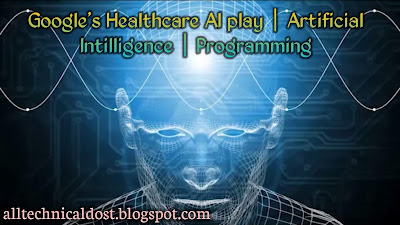Google's Healthcare AI play | Artificial Intilligence| "Programming"
Does Fitbit make a difference?
When Apple's Tim Cook talks about "healthcare" is his legacy, it demonstrates how in the 2020s, AAA gets into healthcare. Of course, here I'm referring to Apple, Amazon, and Alphabet.
When Google absorbed the healthcare arm of AI firm DeepMind, the British company it acquired in 2016 for £400 million ($500 million), you knew Google's entry into healthcare was going to be big.
Now with the $2.1 Billion acquisition of FitBit, Google is signaling that its ambient computing play is for real in how it will be able to provide health services to consumers. In the 2020s, Google will harness patient data and AI to develop a host of tools designed to transform the delivery of care.
Fitbit achieved all that it could in its twelve years, but in recent times Apple has dominated the wearables space with its own pivot into healthcare. Google needs to marry its hardware efforts with its other bets and healthcare play effectively in the 2020s in order to compete.
According to CBInsights, Google is also betting that the future of healthcare is going to be structured data and AI. The company is applying AI to disease detection, new data infrastructure, and potentially insurance.
Google in AI is well-positioned to effectively help transformed for the 21st century. Indeed the AAA companies are expected to help transform healthcare and the patient experience with AI, a much-needed update as healthcare costs continue to balloon as populations age and demographic pyramids become rather inverted.
Even with the addition of Fitbit, Google's Wear OS watches could still fail. It's the other bets of Google and DeepMind that have a more distinct possibility of contributing to the future of healthcare. For the Alphabet to compete with Apple's AppleWatch is not very likely. Google can, however, be the intermediary with Google Assitant's evolution in healthcare.
Google's AI is uniquely positioned in artificial intelligence and data with hopes to reinvent the $3 trillion U.S. healthcare industry. Apple's wearables unit revenue has doubled, so Google's dream of hardware intersecting healthcare is not an area where it's likely to be competitive against the likes of Apple, Xiaomi, Huawei and others.
To quote a paper in Nature, however: The rapid explosion in AI has introduced the possibility of using aggregated healthcare data to produce powerful models that can automate diagnosis and also enable an increasingly precision approach to medicine by tailoring treatments and targeting resources with maximum effectiveness in a timely and dynamic manner.
This is really where DeepMind and Google will be able to do incredible things, more on the B2B healthcare side under the hood. Fitbit, on the other hand, has just 28 million global users, and the company's products could die a predictable death lost in Google's device bureaucracy.
Wearables, hardware and "ambient computing" are hard. It's more likely to be won by a company like Huawei, then a Google who isn't native to the hardware space. Google is trying everything including getting into the Cloud, but healthcare needs a laster focus. Fitbit is just too small a piece of the puzzle to make an effective difference.
Google helping hospitals and doctors directly however could be very lucrative. Google, in conjunction with Stanford Medicine, is beefing up an early-stage research project called Medical Digital Assist as it explores ways to use artificial intelligence to improve visits to the doctor’s office.
Google's machine learning can truly disrupt the patient experience as well. Given the right training, machine learning will be able to help predict patients' care needs, improving nursing outcomes and medial diagnoses that can occur at home. However, the voice interface is more likely to be Alexa, than Google Assistant at this point.
The largest and arguably most valuable store of data in healthcare rests in EMRs. In this domain too I see Amazon out-competing Google for innovations that are directly connected to the Cloud. In short, Google must compete with Amazon and Apple to effectively innovate in healthcare technology, while leveraging its distinct advantages in machine learning, deep learning and AI with its DeepMind unit.
Fitbit's influence on these events are is likely to be negligible. Google's AI health blog, however, is full of how AI is and will impact the healthcare field. Even if Google's ambient computer attempts fail repeatedly, Google's AI is still likely to have a significant impact on the healthcare industry.
In spite of controversy and leaders who embarrass the company, DeepMind Health, the unit which focuses on using AI to improve medical care, is now part of Google's own dedicated healthcare unit. Google Health was created in November 2018 and is run by big-name healthcare CEO David Feinberg.
DeepMind's ability to diagnose conditions will improve every year, and automate some of the tasks eventually in medical diagnosis. The BigTech push of AAA will be able to significantly reduce healthcare costs in the decades ahead. Google will play a significant role in how that occurs as the winners of Silicon Valley eventually push into the bid three industries: healthcare, education and financial services. Amazon, Apple, and Alphabet are all uniquely positioned to contribute to those with AI.
However for the 2020s, and the 2030s it's likely healthcare that's significantly going to see the most disruption and introduction of digital transformation and machine learning.
It's too soon to say what Google Health will be capable of. Thankfully Alphabet has enough cash on hand to fund whatever DeepMind and Waymo One become, and they are likely to be Alphabet's two big winners maturing in the 2030s, and growing up in the 2020s.
In the summer of 2019, in a paper published on Wednesday in the journal Nature, DeepMind researchers said their algorithms correctly predicted 90 percent of acute kidney injuries that would end up requiring dialysis. What further breakthroughs await us by DeepMind and Google Health? We'll be watching this space.
Artificial Intelligence In Healthcare Challenging complexity
StarCraft II’s complexity poses immense challenges to AIs. Unlike chess, StarCraft II has hundreds of 'pieces' — soldiers in the factions' armies — that move simultaneously in real-time, not in an orderly, turn-based fashion. Whereas a chess piece has a limited number of legal moves, AlphaStar has 1026 actions to choose from at any moment. AndStarCraft II, unlike chess, is a game of imperfect information — players often cannot see what their opponent is doing. This makes it unpredictable.
For nearly a decade, researchers have pitted StarCraft- and StarCraft II-playing AIs against one another in an annual competition. However, unlike AlphaStar, most of these 'bots' relied on hard-coded rules, rather than neural networks that can self-train. Oriol Vinyals, who now co-leads the AlphaStar project, was on the team from the University of California, Berkeley, that won the first competition in 2010.
“Back then, I kind of started thinking maybe we should just do [machine] learning, but it was just too early,” says Vinyals.
In 2016, Vinyals joined DeepMind, where he began working on AIs that could teach themselves how to play StarCraft II. AlphaStar started its training by learning to imitate from a set of nearly one million human games. To improve AlphaStar’s play further, DeepMind created a league where versions of the AI competed against one another. This method makes sense for a game like StarCraft II in which no one strategy is best — as well as for many other real-life applications of AI, says Kai Arulkumaran, an AI researcher at Imperial College London.
Perceptive players?
DeepMind also put constraints on AlphaStar to make sure the AI was truly out-thinking and not just out-clicking its human opponents. Because the game rewards an ability to click rapidly, a computer that clicks at superhuman speed might beat humans without being more intelligent or making better decisions. So DeepMind limited the speed of AlphaStar’s reflexes to that of experienced human players.
the European server.
After 50 games, however, DeepMind hit a snag. Some players had noticed that three user accounts on the Battle.net gaming platform had played the exact same number of StarCraft II games over a similar time frame — the three accounts that AlphaStar was secretly using. When watching replays of these matches, players noticed that the account owner was performing actions that would be extremely difficult, if not impossible, for a human. In response, DeepMind began using a number of tricks to keep the trial blind and stop players spotting AlphaStar, such as switching accounts regularly.
The final version of AlphaStar relied on a cumulative 44 days of training and frequently ran into professional players. The AI wasn’t able to beat the best player in the world, as AIs have in chess and Go, but DeepMind considers its benchmark met and says it has completed the starcraft II challenge.
Other AI scientists aren’t yet convinced that AlphaStar can claim complete victory. Dave Churchill, an AI researcher at the Memorial University of Newfoundland in St John's, Canada, thinks that AlphaStar still has a number of weaknesses, such as a vulnerability to strategies it hasn’t seen before.
Other AI scientists aren’t yet convinced that AlphaStar can claim complete victory. Dave Churchill, an AI researcher at the Memorial University of Newfoundland in St John's, Canada, thinks that AlphaStar still has a number of weaknesses, such as a vulnerability to strategies it hasn’t seen before.
“AlphaStar is very impressive, and is definitely the strongest AI system for any StarCraft game to date,” he says. “That being said, StarCraft is nowhere near being 'solved', and AlphaStar is not yet even close to playing at a world champion level.”
Related reading: Why AI is Becoming Dangerous to Global Order.
Follow a Futurist, sign up to receive blog-rolls about breaking news in Business and Technology & related Op-Eds.















0 टिप्पणियाँ